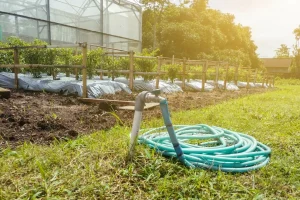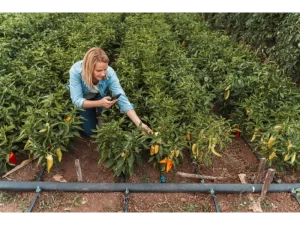Sustainable Agricultural Systems aim to achieve efficient production while minimizing environmental impacts. They also prioritize the conservation of natural resources and the maintenance of biological diversity. Therefore, soil health and water usage must be carefully managed. Furthermore, chemical inputs are reduced to preserve the natural balance. This ensures long-term agricultural production. Moreover, climate-resilient systems should be developed. This enables farmers to adapt more easily to changing conditions. Furthermore, local knowledge and traditional methods should be supported by modern techniques. This increases yield without harming the environment. Methods such as integrated pest management also offer environmentally friendly solutions. This reduces pesticide use. Agricultural waste is recycled, supporting the circular economy.
Contents
- Types of Sustainable Agriculture
- What is Sustainable Agriculture?
- How is Sustainable Agriculture Practiced?
- What are the Benefits of Sustainable Agriculture?
- Why Should We Use Sustainable Agricultural Products?
- Conclusion
- Frequently Asked Questions
Types of Sustainable Agriculture
Sustainable Agriculture Practices encompass methods that produce while conserving natural resources. Therefore, systems that minimize environmental impacts are preferred. Furthermore, organic farming completely eliminates the use of chemicals. This prevents soil and water pollution. Additionally, agroecological farming supports production with an ecosystem-based approach. In this case, biodiversity is preserved and productivity increases. Moreover, permaculture offers designs that are in harmony with nature. Therefore, sustainable living spaces can be created. Moreover, good agricultural practices address both quality and environmental standards. This protects both producers and consumers. Furthermore, integrated production techniques ensure a balance between productivity and the environment. This optimizes resource use. Additionally, conservation agriculture is a processing method that does not disrupt the soil structure.

What is Sustainable Agriculture?
The question “What is Sustainable Agriculture?” is important for defining an environmentally conscious approach to production. Therefore, it encompasses systems that conserve natural resources and increase productivity. It also aims to enable production without compromising soil, water, and air quality. In this way, agricultural activities become sustainable in the long term. It also contributes to the preservation of biological diversity. In this case, production is carried out without disrupting the balance of the ecosystem. Furthermore, the economic well-being of farmers is also taken into account. Therefore, production costs can be reduced while increasing income levels. In addition, the aim is to provide consumers with healthy and reliable products. In this way, public health is supported. Furthermore, climate-resilient agricultural systems are developed. In this case, adaptation to adverse environmental conditions is achieved. Moreover, technology and traditional methods are evaluated together.

How is Sustainable Agriculture Practiced?
The question “How to Practice Sustainable Agriculture” reflects the search for productive and environmentally friendly production. Therefore, natural resources must be used efficiently and sustainably. Additionally, methods that protect soil health should be preferred. This ensures long-term productivity. Furthermore, the use of chemical fertilizers and pesticides should be reduced. This minimizes environmental pollution. Fertilizers with high organic matter content can also be used. This strengthens the soil structure and increases its water retention capacity. Crop rotation practices also prevent soil exhaustion. This reduces the risk of disease and pests. Furthermore, water waste should be reduced through systems such as drip irrigation. This ensures efficient use of water resources. Additionally, chemical dependency can be reduced through natural pest control. This helps maintain biological balance. Furthermore, local knowledge and technologies should be evaluated together.

What are the Benefits of Sustainable Agriculture?
The question “What are the benefits of sustainable agriculture?” is important from an environmental and societal perspective. Therefore, it directly contributes to the conservation of natural resources. Additionally, soil fertility becomes sustainable in the long term. In this way, production capacity is maintained in a stable manner. Furthermore, water resources are used efficiently and waste is prevented. In this case, the risk of drought is reduced. Moreover, the reduction in chemical use prevents environmental pollution. Therefore, the balance of the ecosystem is preserved, and living organisms are not harmed. Furthermore, consumers receive healthy, residue-free products, supporting public health. Farmers’ income stability is maintained, strengthening rural development and social sustainability. It also combats climate change, reduces the carbon footprint, and protects biodiversity. The question “What are the benefits of sustainable agriculture?” reflects its environmental, economic, and social scope, ensuring a livable world for future generations.
Why Should We Use Sustainable Agricultural Products?
The question of why we should use sustainable agricultural products is directly related to healthy living. Therefore, products that do not harm nature should be preferred. In addition, these products do not contain chemical residues and can be consumed safely. In this way, human health is protected. Furthermore, the production process is environmentally friendly. In this case, water and soil pollution are reduced. Moreover, sustainable agriculture supports biodiversity. Thus, the natural balance is preserved, and living organisms are not harmed. Furthermore, producers work under fair conditions and are supported. This also promotes rural development and reduces carbon emissions for climate-friendly production. It contributes to combating climate change and balances natural resource use. Thus, a livable environment is preserved for future generations. Supporting local producers strengthens the economy. The question “Why use sustainable agricultural products?” forms the basis of conscious consumption, protecting both individual health and ecosystem integrity.

Conclusion
Sustainable Agricultural Systems are production models that maintain environmental, economic, and social balance. Therefore, they contribute to both the conservation of natural resources and the welfare of producers. They also ensure that consumers receive healthy and reliable food. Sustainable Agricultural Systems offer effective solutions in combating climate change. In this way, the carbon footprint is reduced and ecosystem balance is maintained. They are also of great importance in terms of local development and food security. Sustainable Agricultural Systems represent an approach that considers the needs of future generations. This enables sustainability for both nature and humanity in the long term.
Frequently Asked Questions
What is sustainable agriculture? It is long-term agricultural production that protects natural resources and does not harm the environment.
Why is sustainable agriculture important? Because it both preserves ecological balance and ensures the continuity of healthy products.
What are the types of sustainable agriculture? Organic farming, agroecological farming, permaculture, good agricultural practices, and integrated production systems.
How is sustainable agriculture practiced? It is practiced by using natural fertilizers, implementing water-saving systems, and reducing the use of chemicals.
Can yields be achieved without using chemical fertilizers? Yes, soils enriched with organic matter can provide high yields in the long term.
What is the environmental contribution of sustainable agriculture? It protects soil, water, and air quality; supports biodiversity and prevents pollution.
Are sustainable agricultural products healthy? Yes, they contain no chemical residues and are safe because they are produced under nature-friendly conditions.
How does sustainable agriculture benefit farmers? Inputs decrease, costs go down, soil health is preserved, and long-term income is secured.
Why should we choose sustainable agriculture products? Because these products protect both our health and the environment.
Will sustainable agriculture be mandatory in the future? Yes, due to the climate crisis and resource scarcity, sustainability is becoming a fundamental necessity.








